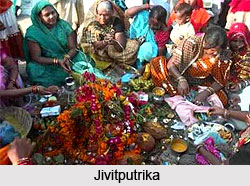 Jivitputrika is a religious festival in India. This festival is celebrated by the people of Bihar, Uttar Pradesh and Jharkhand in the day of Krishna-Paksha in Ashvin month.
Jivitputrika is a religious festival in India. This festival is celebrated by the people of Bihar, Uttar Pradesh and Jharkhand in the day of Krishna-Paksha in Ashvin month.
Observation of Jivitputrika
Jivitputrika festival is celebrated with Nirjala (without water) vrata throughout a day and night. This is observed by mothers for the wellbeing of their children. A three-day-long festival is celebrated from the seventh to ninth lunar day of Krishna-Paksha in Ashvin month. It is celebrated mainly in Bihar, Jharkhand and Uttar Pradesh states of India and Nepal. In the year 2013, Jivitputrika would be observed on September 27.
Mythology of Jivitputrika
It is believed that once an eagle and a female fox lived in a jungle were friends. Once both of them, the fox and the eagle saw some young females performing the puja and fasting and wished to observe it themselves too. Both of them observed the fast but the fox became unconscious because of hunger and had food quietly. On the other hand, the eagle observed the fast with full dedication and completed it. As a result, all the kids born to the fox used to die a few days after birth and the eagle"s offspring were blessed with long life.
History of Jivitputrika
Jimutavahana was the wise and a kind ruler of Gandharvas. Jimutvanhan was not satisfied being a king and as a result he gave all the responsibilities of his kingdom to his brothers and went to the jungle to serve his father. He used to spend his time taking care of his father. One day while wandering in the jungle he found an old woman mourning. He asked the old woman the reason of her weeping on which she told him that she belonged to a family of snakes and had only one son. But as an oath every day one snake is offered to Pakshiraj Garuda as a feed and that day was her son"s chance to become his food. After listening to her problem Jimutavahana consoled her and promised that he would get back her son alive and would protect him from Garuda. He decides to lay down himself on the bed of rocks being presented to the Garuda for the feed. Garuda comes and holds the Jimutvahana covered with red cloth with his fingers and climbs the rock. Garuda finds it surprising when the person he has trapped does not response. He asks the Jimutvahana his identity on which he describes the entire scene to the Garuda. Garuda gets pleased with the bravery and the benevolence of Jimutvahana and leaves him and also promises not to take any sacrifice from the snakes. For the bravery and generosity of Jimutvahana the race of the snakes was saved and as a result since then the fasts for the children"s welfare and long life is observed.
Celebration of Jivitputrika
Jivitputrika festival shows great love and extreme affection of mothers towards their children. The mother keeps a very strict fast, without a drop of water thinking of their children. When done with water it is called khur (dry as hay) Jitiya. A three day long festival is celebrated from the seventh to the ninth lunar day of Krishna Paksha in Ashwin month that falls generally in September. The first day, the day before Jivitputrika is known as Nahai-khai. On that day mothers take food only after having their bath. On Jivitputrika day, a strict fast is observed without water. This is called Khur Jitiya (khur is dry hay). On the third day, the fast ends with Paaran (taking the first food of the day). In Mithilanchal region of northeastern Bihar and eastern Nepal, a variety of food and a special festival delicacy Jhor Bhaat (Jhor is Curry and Bhaat is white rice), Noni ka saag and Madua ki Roti are prepared. In Bhojpuri region of western Bihar, eastern Uttar Pradesh and terrain of Nepal, Paaran is done with Noni ka saag, Maruwa roti and a vegetable stew of zucchini (often considered food of extremely poor peoples) The festival is celebrated mainly in the Bhojpuri and Maithili speaking regions of Nepal and Bihar, Jharkhand and Eastern part of Uttar Pradesh.